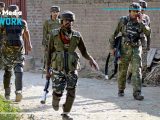
Seizure of Islamic Literature Sparks Outrage in IIOJK
February 20, 2025In a dramatic escalation of censorship in IIOJK, authorities have seized hundreds of copies of books written by renowned Islamic scholar Syed Abul Ala Maududi, igniting widespread protests and concerns over the suppression of free thought.
In recent police raids across the Indian Illegally Occupied region of Jammu and Kashmir (IIOJK), hundreds of books, including works by the esteemed Muslim scholar Syed Abul Ala Maududi, were confiscated. The books were seized from numerous bookshops in towns across the territory, with the police claiming that the action was prompted by “credible intelligence” concerning the illicit sale and distribution of literature promoting Islamic ideology.
The raids, which began on a Saturday morning in Srinagar, spread to other areas of the region, where plainclothes agents from India’s secret agencies reportedly visited bookshops and confiscated copies of Maududi’s works. One of the shop owners recounted, “The Indian police took away all the books authored by Abul Ala Maududi, saying these were banned.” While the police did not specifically identify the author, store owners confirmed that Maududi’s writings were among the targeted items.
Maududi, a highly respected Islamic intellectual and founder of the political party Jamaat-e-Islami, has long been influential in the Muslim world. However, the party has been banned in IIOJK by Narendra Modi’s government since 2019, following the revocation of the region’s special status. Despite the ban, his works continue to be widely regarded as important contributions to Islamic thought.
The raids have sparked significant anger among the Muslim population in the region, with many perceiving them as a direct attack on their religious and intellectual freedoms. Mirwaiz Umar Farooq, a senior leader of the All Parties Hurriyat Conference (APHC) and chief cleric of IIOJK, condemned the actions, calling them “ridiculous.” Farooq emphasized that “policing thought by seizing books is absurd,” especially in an era where information is readily accessible online. His comments resonated with critics who argue that the curtailment of civil liberties and suppression of free speech have intensified since Modi’s government took direct control over IIOJK.
The police justified the seizures by stating that the operation aimed to prevent the circulation of “banned literature linked to Jamaat-e-Islami.” Yet, many residents and critics argue that such actions are symptomatic of a broader strategy to stifle dissent and intellectual freedom in the region. Since the revocation of IIOJK’s special status in 2019, the region has seen heightened restrictions on its people’s rights, leading to increasing unrest and frustration.
These raids have further fueled concerns over the future of freedom of expression in the region, with many fearing that the ongoing crackdown on Islamic literature is only the latest in a series of attempts to suppress voices of dissent. The controversy underscores a larger debate about the balance between national security and the fundamental rights of the people in IIOJK, particularly the right to access and disseminate knowledge without fear of government intervention.

